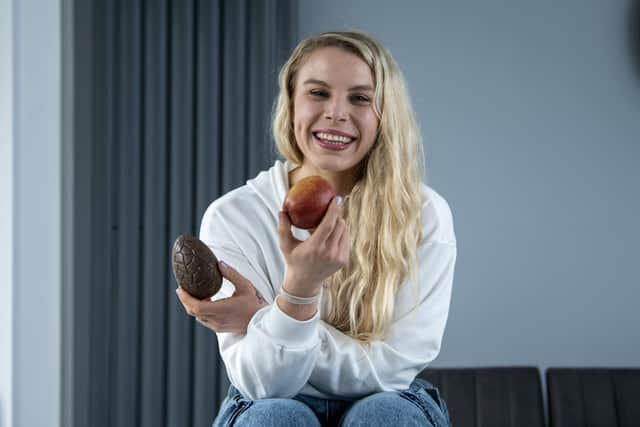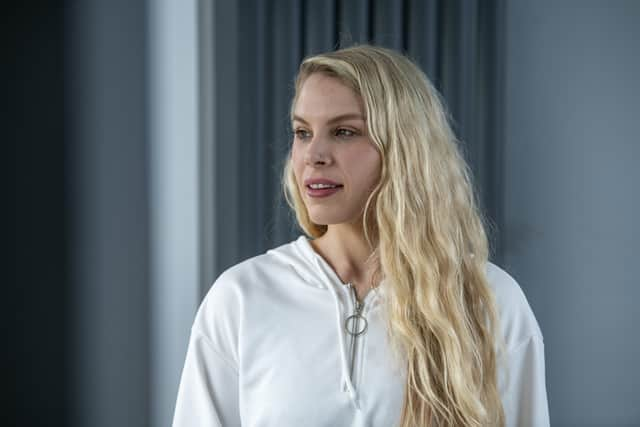Leeds woman felt 'all-consumed' by eating disorders - but now she's thriving as a successful nutritionist
and live on Freeview channel 276
Sophia Harris, 35, has spoken candidly about suffering with anorexia and bulimia when she was younger.
Her experience gave her an understanding of disordered behaviours around food, which she now uses to coach clients with her business Apollo Nutrition.
Advertisement
Hide AdAdvertisement
Hide Ad

"It was very isolating," explained Sophia, who was diagnosed with anorexia when she was 14. "It forces you to behave in a really secretive way and you feel a lot of shame."
As a teenager, she worked at a high street bank. On two separate occasions, her exhaustion led to her collapsing and ambulances were called.
"Everything felt overwhelming," she said. "I was really struggling and it was having such a negative impact on my life."
After a particularly difficult day, she broke down and confided in her manager. She said her "long and painful" recovery began from there.
Advertisement
Hide AdAdvertisement
Hide AdSophia, a fitness enthusiast, said that she initially started going to the gym for the wrong reasons.
"I was stuck in a battle with eating disorders for 10 years and I started working out as a way to be skinny," she explained.
"It was coming from a very disordered place. The fitness industry glamorises dedication and strictness - and I'm not saying that everyone who is strict has disordered behaviours with food - but we can take health and fitness to the extreme."
However, she added: "Over time, I learned more about food and fuelling my body. That was the first stage of breaking away from the eating disorders.
Advertisement
Hide AdAdvertisement
Hide Ad"I was sick of food being the first and last thing I thought about every day. I used to stress over social occasions, worrying about what I could and couldn't eat. It was all-consuming."
In many ways, Sophia said that the hyper-fixation on gym culture was harder to ditch than the eating disorders themselves.
It doesn't help that so many fitness models project idealised images of the perfect body, she argued.
"In the fitness industry, there are lots of models who look the epitome of health, when in fact the majority are far from it. And I think that's getting worse.
Advertisement
Hide AdAdvertisement
Hide Ad"I was lucky - when I was struggling with eating disorders, social media was not the way it is now. I honestly don't know if I'd still be here if it was.
"We are bombarded with images of perfection. We are told that being smaller and leaner is success. There are even AI models - they're not real people, but they look incredible."


When asked what she thought could be done, she said: "I think we need more education on eating disorders. And we need more diversity in the media, with different shapes, sizes and abilities."
Sophia quit the corporate world six years ago to launch her business as a nutritionist and food relationship coach.
Advertisement
Hide AdAdvertisement
Hide AdShe hosts weekly check-ins, with clients sharing updates on their progress. Sophia offers nutrition recommendations and training programmes as part of the coaching. This could also include 'mindful eating techniques'.
She said: "We all live really fast-paced lives and are super stressed all of the time.
"That means that we can get to the end of the day and not really have had the chance to enjoy our food. We might not be conscious of what we've had - we're just grabbing things on auto-pilot.
"Mindful eating allows us to come more back to the present moment and make conscious food choices. It allows us to find proper enjoyment in our food, because it should be more than just fuel."
Advertisement
Hide AdAdvertisement
Hide AdShe added: "Waking up every day and feeling like I'm genuinely helping people is amazing.
"There's nothing better than talking to a client who might not have eaten a slice of cake for a year. When they tell us that they enjoyed a piece of cake on their child's birthday, that's what life is all about."
Comment Guidelines
National World encourages reader discussion on our stories. User feedback, insights and back-and-forth exchanges add a rich layer of context to reporting. Please review our Community Guidelines before commenting.
